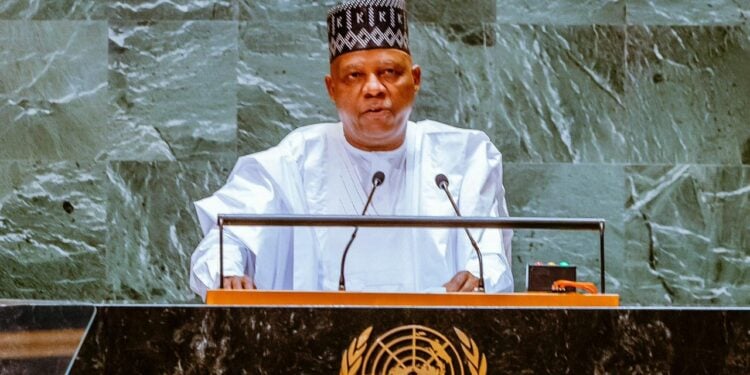Nigeria’s presentation at the 79th United Nations General Assembly was more than just a diplomatic exercise; it was a bold call to rethink the structures that define global governance. Delivered by Vice President Kashim Shettima, on behalf of President Bola Tinubu, the address touched on issues that transcend Nigeria’s borders – climate change, debt relief, and the deep inequities in global power structures, particularly at the United Nations.
The core of Nigeria’s message is both urgent and logical: today’s crises, whether economic, environmental, or security-related, demand solutions that are as interconnected as the problems themselves. The UN, as it currently stands, is not equipped to handle these challenges.
In our view, Nigeria’s proposal for a more inclusive Security Council, one that reflects the realities of the 21st century, is long overdue.
In a world where Africa, home to 1.4 billion people and some of the fastest-growing economies, has no permanent voice on the UN Security Council, the call for reform is not only justified, it is essential.
As Tinubu pointed out, the Council is a relic of a post-World War II order that no longer reflects the world we live in today. His argument that Africa deserves a permanent seat is more than just a plea for representation; it is a demand for the inclusion of perspectives that could reshape global responses to pressing issues like terrorism, migration, and climate change.
One of the most compelling aspects of Nigeria’s message is its call for debt relief for developing nations. Tinubu’s argument here is strikingly clear: when countries are crushed by debt, their ability to invest in critical sectors like healthcare, education, and infrastructure is severely compromised. The result is not just national instability but regional and even global insecurity.
The West’s reluctance to seriously address this issue, despite growing crises in nations across the Global South, only exacerbates the problem. Debt relief, in this context, is not charity; it’s a strategic imperative for global stability.
Equally important is Nigeria’s focus on climate change, a crisis that hits the Global South hardest. Tinubu’s reference to the floods that have devastated parts of Nigeria, including major cities like Maiduguri, underscores a point often lost in Western discourse: for many nations, climate change is not a distant threat but an immediate danger. His call for the global community to honor its COP commitments is a reminder that, for some countries, survival depends on it. Climate inaction, particularly by wealthier nations, is not just negligent, it’s dangerous.
On terrorism, Nigeria is once again positioning itself as a leader, with plans for the upcoming High-Level African Counter-Terrorism Meeting. This is a recognition that terrorism, like climate change, is a global problem requiring global solutions. And yet, Nigeria’s emphasis on addressing the root causes of conflic like poverty, hunger, inequality, goes beyond the usual security-centric responses.
This is where Nigeria’s voice is particularly compelling: it understands, perhaps better than most, that the roots of extremism are often found in systemic inequality and exclusion.
Moreover, Nigeria’s call aligns with a broader movement towards greater representation for the Global South. From the expansion of BRICS to the African Union’s recent inclusion in the G20, the world is slowly recognising that the voices of emerging economies can no longer be sidelined. Nigeria’s proposals at the UN are part of this shift, one that Western powers would be wise to engage with, rather than resist.
To be sure, Nigeria faces its own internal challenges such as corruption, insecurity, and governance issues. But rather than undermine the country’s credibility, these challenges lend weight to its call for global cooperation. Nigeria knows the complexity of development in the 21st century firsthand, and its voice carries the authority of experience.
The global order, as it stands, is at a crossroads. We can cling to outdated structures and policies, or we can adapt, embracing the idea that a more inclusive, equitable system benefits everyone. Nigeria’s presentation at UNGA offers a path forward, one that requires courage and a willingness to listen. It’s a vision worth considering—because the alternative, a world fractured by division and paralyzed in the face of shared threats, is simply untenable.
The question now is whether the international community, particularly Western powers, will listen. Will they reform the UN to include African voices in the Security Council? Will they take seriously the need for debt relief, not as an act of charity but as an investment in global stability? And will they finally commit to meaningful action on climate change, recognising that the survival of nations, and perhaps the planet, depends on it?



